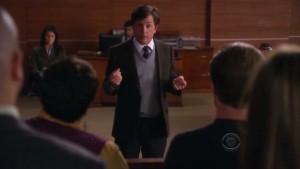The Good Wife – “Poisoned Pill”
“We need to give the truth the drama of a lie.”
Sometimes reviewing a consistently solid shows is a challenge. It’s hard to say much new about them. This, of course, applies to procedurals in general, but it becomes especially difficult when a show like The Good Wife. You end up trying to find something to hang your review on, and that can be tricky.
Luckily, The Good Wife often provides a peg to drape itself over pretty consistently. Sure, it was easier last season when the episode titles told me what to look for (“Doubt”, “Fleas”, “Boom”), but I like not being told what the peg is, even if the episode makes it pretty obvious, and boy oh boy is “Poisoned Pill” a super-cynical episode of The Good Wife.
One of the viewing pleasures of The Good Wife, I think, is that it allows us not to be cynical just for a moment. The show is, after all, a supremely cynical show. The defendants are never exactly as pure as they seem (cross necklace or no cross necklace), no one does anything simply because they’re nice, and, as always, people are quick to believe the worst in people without first stopping to consider other potential reasons for actions.
Take, for example, the “dirt” that Wendy Scott Carr had breast implants because she wanted them, spent $19,000 on the surgery despite being a champion of the poor. Eli, and Childs’ now ex-campaign manager, immediately pounce on it, seizing it as an opportunity to paint her as a phony. Now, readers, raise your hand if the first thought you had was, “Wait. Shouldn’t you check to see if she had breast cancer first?” Because that was certainly my first thought. But, no. Cynical universe.
Or Grace’s passion for Carr as a candidate. There’s something very obvious that show is doing here, and by specifically mentioning President Obama in the same breath, makes it all very clear. And there’s a cynical nature to the fact that Alicia has to sit her daughter down and tell her that she can’t go to rallies or speak in support of Carr. We understand why, from a political stand point, but it seems like a good way to disengage a young voter, a good way to turn her against her own father a bit.
In both cases, I think we can revel in our comparative lack of cynicism, in our desire for a slightly more idealized view of the world. If audiences found comfort in The West Wing‘s quixotic view of White House staffers (and we certainly did, otherwise the MS storyline wouldn’t have worked as well as it did), we find comfort in this all-too-cynical world that is The Good Wife by saying, “Well, I’m a bit more trusting than that.”
If it were just that pat though. The shows forces us into a cynical position while allowing us to be above it at the same time. Of course I refer to Blake’s association with Baltimore drug dealers (resisting writing…crack fic….about…The Wire…) and the apparent burglary and beating of the therapist. The bits of information coupled with the look of legitimate concern on Kalinda’s face as she puts the two together put us into a position about believing the worst of Blake, regardless of the lack of evidence.
Indeed, this is the first time I’ve thought the whole Kalinda-Blake thing has kind of worked, but remains on remarkably shaky ground since the foundation for their antagonism was really poorly developed at the start of the season. Part me thinks that, for other critics and viewers (and here’s me being cynical), that they’re forgiving what is an otherwise poorly plotted narrative because of their associations with Scott Porter from Friday Night Lights. I admit that my lack of interest stems from my frustrations with Kalinda, and I can take or leave Scott Porter.
I will say that I find Porter’s performance is very off, sometimes. I’m not sure he’s skilled enough to play this part when he, as an actor, clearly doesn’t have all the information on his character. Some folks excel at this (Michael Emerson, for example), but I think Porter is trying almost too hard, like in that elevator scene with Will. It just doesn’t work for me. At all.
But maybe I’m just being cynical.
- November 13, 2010
- Noel
- Episode Review
- The Good Wife


